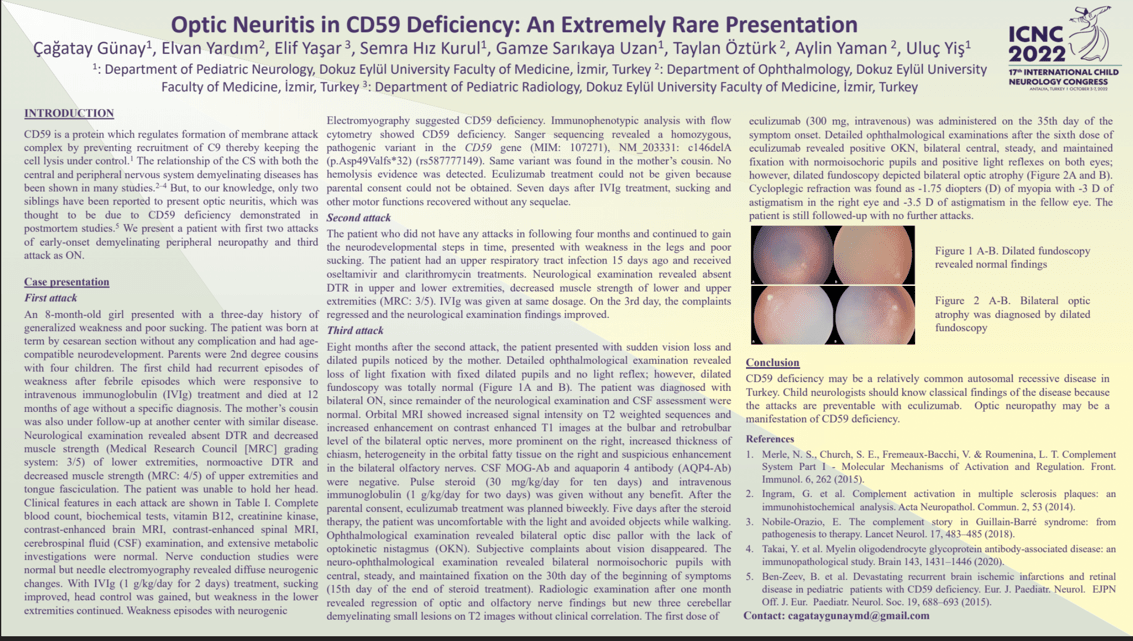Optic Neuritis in CD59 Deficiency: An Extremely Rare Presentation
Çağatay Günay, Elvan Yardım, Elif Yaşar, Semra Hız Kurul, Gamze Sarıkaya Uzan, Taylan Öztürk, Aylin Yaman, Uluç Yiş
OBJECTIVE: CD59 is the principal cell inhibitor of complement membrane attack on cells. Inherited CD59 deficiency is a rare disease presenting stroke, peripheral neuropathy, and recurrent central nervous system attacks.
METHOD: We report a patient with CD59 deficiency associated with two attacks of demyelinating peripheral neuropathy and third attack as an isolated optic neuritis.
RESULTS: An 8-month-old girl whose sibling died at 12 months of age with recurrent weakness episodes responsive to intravenous immunoglobulin treatment, presented with weakness in legs and poor sucking. Weakness episodes with neurogenic electromyography suggested CD59 deficiency. Immunophenotypic analysis with flow cytometry showed CD59 deficiency. Sanger sequencing of CD59 gene revealed a homozygous c.146delA (p.Asp49Valfs*32) mutation. First two attacks were treated with intravenous immunoglobulin therapy without any sequalae. Third attack was an isolated optic neuritis which could not be explained by any other entities. The patient did not respond to intravenous immunoglobulin, but benefited from pulse steroid therapy. Eculizumab was started every two weeks in order to prevent possible advanced attacks and to reduce their severity.
CONCLUSION: Although it is a rarely reported disease, the better recognition by pediatric neurologists is requisite because of the curable aspect. In addition to the different presentations reported, optic neuritis may also be a manifestation in CD59 deficiency.
Keywords: complement inhibition, immune dysregulation, demyelinating, eculizumab, optic neuritis
Çağatay Günay
Dokuz Eylul University Faculty of Medicine
Turkey
Elvan Yardım
Dokuz Eylul University Faculty of Medicine
Turkey
Elif Yaşar
Dokuz Eylul University Faculty of Medicine
Turkey
Semra Hız Kurul
Dokuz Eylul University Faculty of Medicine
Gamze Sarıkaya Uzan
Dokuz Eylul University Faculty of Medicine
Taylan Öztürk
Dokuz Eylul University Faculty of Medicine
Aylin Yaman
Dokuz Eylul University Faculty of Medicine
OBJECTIVE: CD59 is the principal cell inhibitor of complement membrane attack on cells. Inherited CD59 deficiency is a rare disease presenting stroke, peripheral neuropathy, and recurrent central nervous system attacks.
METHOD: We report a patient with CD59 deficiency associated with two attacks of demyelinating peripheral neuropathy and third attack as an isolated optic neuritis.
RESULTS: An 8-month-old girl whose sibling died at 12 months of age with recurrent weakness episodes responsive to intravenous immunoglobulin treatment, presented with weakness in legs and poor sucking. Weakness episodes with neurogenic electromyography suggested CD59 deficiency. Immunophenotypic analysis with flow cytometry showed CD59 deficiency. Sanger sequencing of CD59 gene revealed a homozygous c.146delA (p.Asp49Valfs*32) mutation. First two attacks were treated with intravenous immunoglobulin therapy without any sequalae. Third attack was an isolated optic neuritis which could not be explained by any other entities. The patient did not respond to intravenous immunoglobulin, but benefited from pulse steroid therapy. Eculizumab was started every two weeks in order to prevent possible advanced attacks and to reduce their severity.
CONCLUSION: Although it is a rarely reported disease, the better recognition by pediatric neurologists is requisite because of the curable aspect. In addition to the different presentations reported, optic neuritis may also be a manifestation in CD59 deficiency.
Keywords: complement inhibition, immune dysregulation, demyelinating, eculizumab, optic neuritis
Çağatay Günay
Dokuz Eylul University Faculty of Medicine
Turkey
Elvan Yardım
Dokuz Eylul University Faculty of Medicine
Turkey
Elif Yaşar
Dokuz Eylul University Faculty of Medicine
Turkey
Semra Hız Kurul
Dokuz Eylul University Faculty of Medicine
Gamze Sarıkaya Uzan
Dokuz Eylul University Faculty of Medicine
Taylan Öztürk
Dokuz Eylul University Faculty of Medicine
Aylin Yaman
Dokuz Eylul University Faculty of Medicine

Çağatay Günay
Dokuz Eylul University Faculty of Medicine Turkey
Dokuz Eylul University Faculty of Medicine Turkey